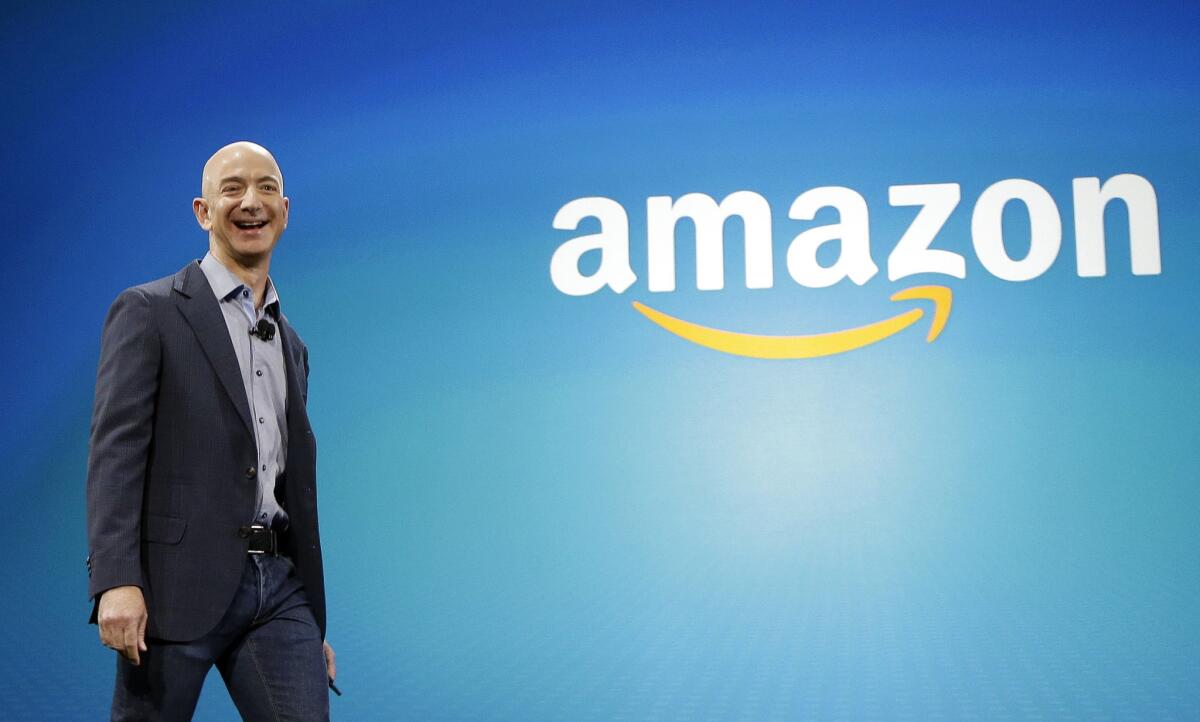Boycott Amazon? It’s not an easy choice

Amazon CEO Jeff Bezos walks onstage for the launch of the Fire Phone last year in Seattle.
- Share via
There are plenty of examples of consumers flexing their economic muscle in response to what they see as businesses behaving badly.
Take the boycott of California grapes in the 1960s over mistreatment of farmworkers. Or the boycott of Chick-fil-A in 2012 over the fast-food chain’s opposition to same-sex marriage.
So what, if anything, should be done about Amazon.com?
The world’s largest e-tailer has been in hot water all week after the New York Times ran a front-page story about the company’s employment practices. It included tales of workers being bullied, harassed and basically made to feel miserable.
The enduring image from the story was that of Amazon staffers routinely breaking down in tears at their desks.
Jeff Bezos, Amazon’s founder and chief executive, didn’t deny the allegations. He just said this was all news to him.
“The article doesn’t describe the Amazon I know or the caring Amazonians I work with every day,” Bezos said in a memo to employees.
The story, he said, “claims that our intentional approach is to create a soulless, dystopian workplace where no fun is had and no laughter heard. Again, I don’t recognize this Amazon, and I very much hope you don’t, either.”
Be that as it may, Amazon customers face a quandary. Do they continue shopping on the site as if nothing were amiss? Or do they respond in some way so the company understands their concern?
“These are very interesting questions,” said Lars Perner, an assistant professor of marketing at USC’s Marshall School of Business. “You might think about boycotting, but that’s difficult given the sheer size of Amazon.”
Like me, Perner is a regular Amazon customer. And like me, he’s feeling conflicted about doing business with a company that may ride roughshod over its workers.
“I’m still trying to make sense of it all — what’s the truth, what isn’t,” Perner said. “It would be very hard to give Amazon up.”
The story included anecdotal tales about one worker who was given a low performance rating after returning from treatment for thyroid cancer, and another with breast cancer who was put on a “performance improvement plan” — Amazon-speak for probation.
One employee was quoted as saying that she had to leave for a business trip the day after she miscarried twins. “The work is still going to need to get done,” she said her boss told her.
Some consumer actions are more clear-cut than others. When Nike wearers learned in the 1990s that the company’s pricey shoes were manufactured in Southeast Asian sweatshops, with some workers making as little as 14 cents an hour, a global boycott seemed reasonable.
And it succeeded. Nike, acting out of self-preservation if not moral clarity, pledged to become a leader in fair labor practices.
“The Nike product has become synonymous with slave wages, forced overtime and arbitrary abuse,” then-CEO Phil Knight said in 1998. “I truly believe the American consumer doesn’t want to buy products made under abusive conditions.”
But does the American consumer want to buy products from a digital dynamo that pushes its employees around? Or is the American consumer willing to look the other way to keep enjoying low prices and free shipping for orders over $35?
“I don’t think you’ll see much of a response from Amazon customers,” predicted Ann Bastianelli, senior adjunct professor of marketing at Indiana University’s Kelley School of Business. “At the end of the day, people will do the most convenient thing.”
That seemed to be the case in 2011 after reports that Amazon forced warehouse employees near Allentown, Pa., to work in 114-degree heat, with paramedics waiting nearby for when they’d collapse. There was a protest, and Bezos promised to install air conditioners. But it seemed as if many customers shrugged off the incident.
Bastianelli suggested that sometimes the ends justify the means. She recalled working around 1980 with Indiana’s Bob Knight, who was the winningest college basketball coach at the time but also was known for his fiery temper and angry outbursts.
An irate Knight once threw a chair across the court during a 1985 game.
“I’m a big fan of Coach Knight,” Bastianelli said. “The fans wanted to win, period. He could take things that were ordinary and make them extraordinary.”
The same could be said of Amazon. There’s no question that the company is really good at what it does. That’s why Wall Street hardly flinched after this week’s bad-place-to-work story ran.
And it’s clear that, unpleasant though the conditions may be, Amazon is no forced-labor sweatshop for its white-collar employees. They’re free to seek gigs elsewhere in the tech world.
My response as a customer, therefore, isn’t to take my business elsewhere. I mean, where would I go to match Amazon’s impressive service and vast inventory?
“When consumers are concerned about a company’s practices or policy positions, it’s more effective to make your concerns known to the company in a public way, rather than just privately boycotting the company,” advised Emily Rusch, executive director of the California Public Interest Research Group.
This column represents my little bit. Here’s how you can do yours: Bezos’ email address is [email protected] — and I’m told he really reads his email.
Let him know you’re not cool with the company being uncool.
I like Amazon. I want it to succeed.
But not at any cost.
David Lazarus’ column runs Tuesdays and Fridays. He also can be seen daily on KTLA-TV Channel 5 and followed on Twitter @Davidlaz. Send your tips or feedback to [email protected].
More to Read
Inside the business of entertainment
The Wide Shot brings you news, analysis and insights on everything from streaming wars to production — and what it all means for the future.
You may occasionally receive promotional content from the Los Angeles Times.











